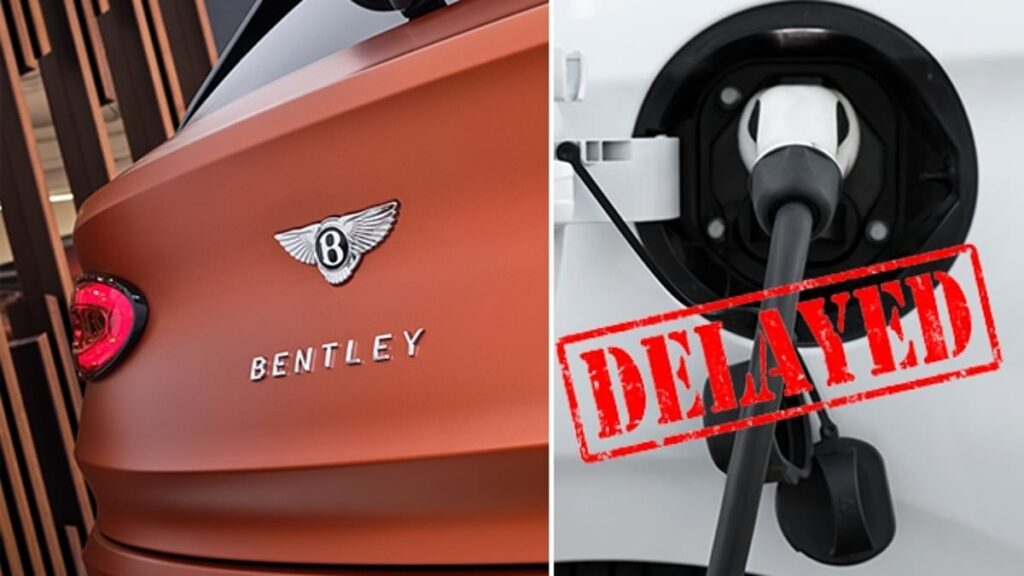Bentley is to delay going fully electric by five years to 2035 as it slams the brakes on its drive to an electrified future, it confirmed on Thursday.
The British luxury firm’s original 2030 deadline to transition away from the internal combustion engine has now officially been scrapped.
And it also announced that its first EV due to be unveiled in 2026 will no longer be a sleek electric grand tourer GT that was first hinted – instead, it will be a large urban SUV.
In a blow to both it – and the government’s – future electric car ambitions, Bentley says current falling demand for EVs and a lack of a suitable public charging infrastructure is to blame for the delay.
Bentley backs out of 2030 electric promise: The iconic British brand previously said it would ditch petrol engines at the end of the decade but has postponed its ambitions due to a decline in EV demand and public charging
It is almost four years to the date that Bentley made its bold announcement that it would turn its back on the internal combustion engine in 2030 after relying on it for 111 years.
On 5 November 2020, it said it would be lead the market by ‘reinventing the company and becoming the world’s benchmark luxury car business’ in an electric future from the end of the decade.
However, today, it confirmed it will not deliver on this promise until five years later than originally planned.
To plug the gap to 2035, Bentley says it is to boost production and extend the life-cycle of petrol-electric plug-in hybrid models or plug-in hybrids (PHEVs).
It says beyond the new Crewe-built electric SUV there will be a new model launched every year until 2035, but that to give it flexibility, this will be either a PHEV or pure electric model. But it cannot say yet when the second or subsequent electric models will appear.
All of these will be ‘designed and developed’ in Crewe, which employs around 4,000 people, but it cannot give a cast-iron commitment that these will also be manufactured in Crewe. Bentley said that is the ‘hope’.
The firm said the ‘new strategic announcements’ meant the new EV timetable would ‘move the luxury marque’s ambitions beyond 2030, to 2035’.
It means Bentley has followed in the tyre tracks of other major car makers who have also delayed their schedules to go fully electric.

Bentley had made a significant song and dance in November 2020 about its bold aspirations of becoming an electric-only brand in 2030, which would have seen it end a 111-year relationship with the internal combustion engine. It even unveiled this EXP 100 GT electric concept car

Bentley’s first EV is due to be unveiled in 2026. However, it won’t be a sleek electric grand tourer GT like the EXP 100 GT concept originally promised

Instead of a stunning electric GT model like this, Bentley’s first EV will be a large urban SUV -and it WON’T be a Bentayga EV
First full EV will be an SUV
Bentley bosses said the first fully electric – which will be in showrooms by 2027 – would still be a ‘milestone’ despite being an SUV instead of a dramatic GT car.
Disguised running prototypes are already being tested on the road, it said.
Justifying the switch in strategy to delay going fully electric since the original plan was announced he said: ‘A lot has changed since then. We all know the automotive market looks different.’
It said the new luxury urban SUV will be a completely new car under 5 metres in length and smaller in scale than the current Bentayga to allow for easier on-street parking. It will be versatile for use in cities and long range. It is designed to bring in new customers.
The firm is also working on an ‘exciting’ noise to replace the normal engine roar.
Bentley joins queue of car makers ditching EV plans
In September, Volvo announced it would not become an electric-only car brand from 2030, as it had previously promised.
It instead said it aims for 90 to 100 per cent of its global sales to be either pure electric or plug-in hybrid by the end of the decade.
Luxury car maker Porsche also announced this autumn it was pushing back its plans as a result of the transition to EV taking longer than it thought.
It has announced it is watering down its aims for 80 per cent of sales to be all-electric by 2030 and went on to confirm it will continue to sell the existing Cayenne SUV with combustion engines into the next decade.
In recent months, Toyota has confirmed it will significantly reduce its EV production volumes for 2026, while Renault’s boss said car makers were not on the ‘right trajectory’ to go fully electric by 2035 – the EU’s proposed date to ban new petrol and diesel cars, which is five years later than the UK’s deadline.
Ford bosses in July said it will not go fully electric in 2030, despite claiming it would back in February 2021.
And one of Bentley’s biggest rivals, Aston Martin, has also said it is delaying the launch of its first EV in response in declining demand for new electric cars.
The industry’s mass retreat on EV promises also comes against a backdrop of brands slashing their existing electric car prices in an effort to drum-up sales, announcements of extended lifecycles for petrol cars and some brands temporarily shutting down battery vehicle production lines due to a lack of demand.
Jaguar, on the other hand, has taken a much different approach and pushed ahead with its ambitions to become an EV-only luxury brand from next year. In fact, it has stopped producing internal combustion engine cars entirely – and won’t sell any new vehicles for a year as it shifts to battery power.
Why has Bentley postponed its EV pledge?
The EV delay also comes as sluggish take up of electric vehicles – particularly by private buyers – and many manufacturers on course to miss strict government sales targets set out in its controversial Zero Emission Vehicle (ZEV) Mandate.
However, as a niche luxury manufacturer, Bentley is not affected by these minimum sales thresholds and therefore has more control over when it wants to ditch internal combustion engines entirely.
Bentley’s new ‘Beyond 100+’ strategy has been drawn up by incoming CEO and chairman Dr Frank-Steffen Walliser who said it had been necessary to ‘adapt to today’s economic, market and legislative environment to initiate a major transformative phase for tomorrow’.
Previous CEO and chairman Adrian Hallmark, who masterminded Bentley’s original Beyond 100 strategy to go fully electric by 2030, left the company suddenly in March after a six year stint to take up the top job at rivals Aston Martin from September.

Bentley’s new ‘Beyond 100+’ strategy has been drawn up by incoming CEO and chairman Dr Frank-Steffen Walliser, who is moving across from Porsche
The British Luxury car maker said today: ‘Bentley Motors today announced an extension of its forward-thinking Beyond100 business strategy, now called Beyond100+, from 2030 to 2035.
‘Bentley has also confirmed that its first fully electric car to be revealed in 2026 promises to create an entirely new segment, the world’s first true Luxury Urban SUV.’
It said: ‘This model, designed, developed and to be produced at its headquarters in Crewe, will be the first of a new PHEV or BEV [battery electric vehicle] model to be launched every year over the next decade as Bentley’s product and investment offensive continues at pace with an ambition to be building only fully electric cars from 2035.’
The company added: ‘Bentley, already leading the way in the luxury hybrid car sector, will consequently further cement this position by extending the lifecycle of PHEV models beyond 2030, to 2035.’
It noted that the Continental GT coupe, Convertible and Flying Spur models are already offered with an ultra performance plug-in V8 hybrid powertrain following the discontinuation after more than 20 years of Bentley’s powerful W12 engine.

The Crewe factory will undergo a ‘fundamental reinvention’ to ‘helps secure Bentley’s future for the next generation of products and colleagues’
Plans to invest in Crewe factory for an EV future
New Bentley chairman and CEO Dr Frank-Steffen Walliser, who joined the company from German performance car firm Porsche said: ‘Four years almost to the day that Bentley initially outlined its Beyond100 strategy, we adapt to today’s economic, market and legislative environment to initiate a major transformative phase for tomorrow.
‘Beyond100+ becomes our guiding light as we extend our ambitions beyond 2030, while maintaining our aim of a decarbonised future, including offering only fully electric cars from 2035, and reinforcing our credentials as the British creator of extraordinary cars for over a century and beyond.’
He said the new strategy also ‘endures a fundamental reinvention of the Crewe manufacturing infrastructure, and helps secure Bentley’s future at Crewe for the next generation of products and colleagues.’
Bentley said the company has already made ‘enormous strides’ in reinventing the historic Crewe site, to create an industry-leading green certified carbon neutral facility.
It is now focussed on ‘building a “Dream Factory” for an electric future’. The largest self-funded site investment programme in Bentley’s 105-year history includes a new state-of-the-art design centre, paint shop and electric-car assembly line.
This will transform the 85-year-old site ‘for a new age of electrification and a new benchmark in next generation, digital, flexible and high-value manufacturing operations’.
Some links in this article may be affiliate links. If you click on them we may earn a small commission. That helps us fund This Is Money, and keep it free to use. We do not write articles to promote products. We do not allow any commercial relationship to affect our editorial independence.










